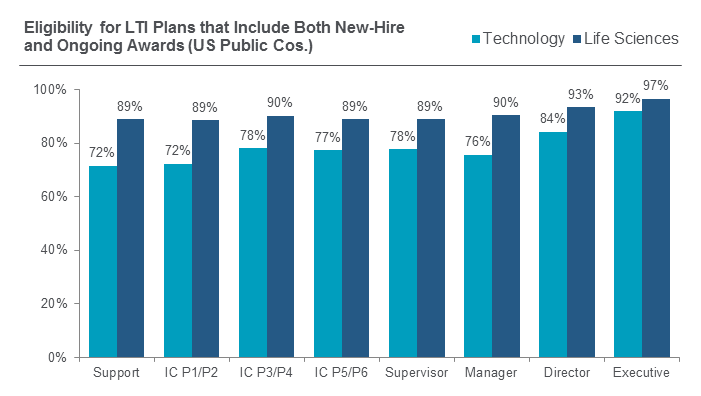New data from Radford shows that technology companies are more likely than life sciences firms to exclude new-hire awards from their long-term equity plans for non-executives.
It's well-known that companies differentiate their long-term incentive (LTI) practices between executive and non-executive employees in many ways. However, when we think about those differences, most people usually jump to questions of award size, vesting schedules and equity vehicle mix (e.g., stock options vs. restricted stock units vs. performance-based equity). Those issues are incredibly important, but actually not as fundamental as a more basic set of questions: who gets equity and when?
Specifically, where in the organization do companies begin to cut back on equity eligibility? And to dig a bit deeper, who is eligible for new-hire awards vs. ongoing annual awards?
Using data from the Radford Global Technology Survey, we find that US publicly-traded technology companies are more likely to offer executives and, to a lesser extent, directors long-term equity plans that include both new-hire and ongoing equity grants. At the Executive level, 92% of companies provide eligibility for LTI plans that include new-hire and ongoing awards. This is not surprising as long-term incentives are typically the largest component of executive pay. However, eligibility for plans that include both types of awards drops with nearly each job level: from 84% for director positions to as low as 72% for support roles.
In contrast, life sciences companies appear to be far more egalitarian at all levels. Using the Radford Global Life Sciences Survey, we find higher rates of eligibility for plans that include both new-hire and ongoing awards. And while technology companies are less likely to offer non-executive employees new-hire awards, life sciences companies maintain a fairly consistent approach across job levels in offering plans that include both new-hire and ongoing awards. Ninety-seven percent of executives are eligible for new-hire and ongoing awards, declining only to 93% for directors and 89% for the support function.

Generally speaking, technology and life sciences companies share many of the same characteristics in their employee equity programs: they rely far more heavily on equity relative to all other industries to preserve cash and incentivize employees through uncertain innovation cycles. Yet, there are also important differences between the two sectors. Headcounts at technology firms tend to be much larger and public technology firms are usually generating more predicable revenue. In contrast, many pre-commercial life sciences companies are public, but they are still very small organizations with no revenue, making equity awards an even more important retention tool.
Looking at just the single design choice of equity plan eligibility, we find that technology companies are actually a bit less broad-based in their equity use than some might expect. Technology companies, who have faced years of investor pressure to reduce equity burn rates and expense, are often looking for ways to shave down equity use. Limiting new-hire awards is certainly a way to achieve that goal.
Of course, it's important to note that eligibility does not translate into actual award receipt rates. Equity receipt rates for both new-hire and ongoing awards can be significantly lower than eligibility levels. This is a topic we'll explore in future articles.
To learn more about participating in a Radford survey, please contact our team. To speak with a member of our compensation consulting group, please write to consulting@radford.com.
Related Articles